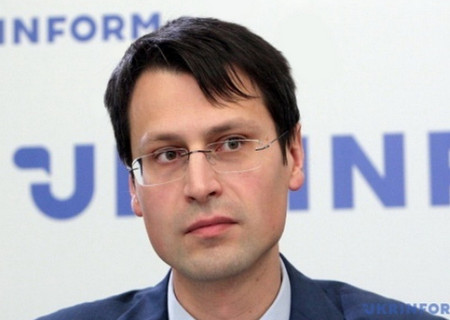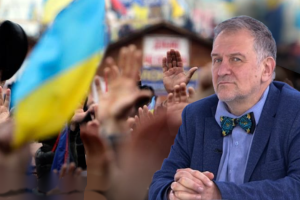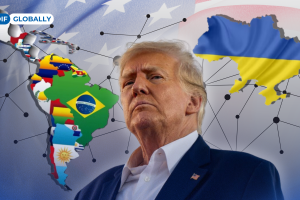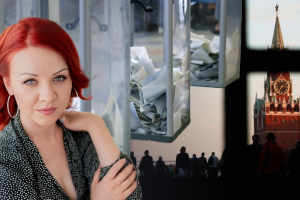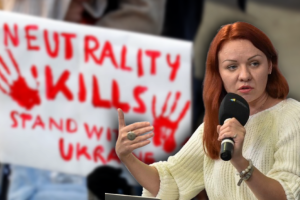An extremely alarming call for Putin. The ghost of 1917 appeared in Russia
Source: NV
Putin is not strengthening the Russian state, he is destroying it.
The incident in Bryansk which happened last week is a consequence of Putin's attack on Ukraine. Before Russia started this war, none of the Russian nationalists had the determination to take up arms and start fighting, to call for the overthrow of Putin's regime and to seize power by military means.
We remember that this has happened before in Russian history. And this happened in the 20th century, when in 1914 the Russian Empire was one of those that started World War I. And in 1917, a revolution occurred: all over Russia, bands of armed men who participated in the war began to seize power under the leadership of various leaders - leftists, rightists, anarchists, monarchists, and so on. Perhaps history repeats itself, as the classics said, but on a new level.
About the chronology. Let's recall an interesting moment. On Feb. 28 of this year, Putin spoke to the board of the FSB. This is his alma mater, the environment in which he was formed as a personality - KGB, FSB. So: Putin's texts in this case are prepared very carefully, and every word and every instruction is important. This speech was short, but Putin gave it a special emphasis – he even emphasized that the special task of the FSB and units of the FSB border troops is to provide cover and protect the border precisely on the Ukrainian-Russian section. And, probably, here he had in mind the entire length of the border.
And now, a day after these instructions, on March 2, when Putin warned that there could be terrorist attacks, hostage taking, attacks on civilians, on critical infrastructure facilities, events are taking place. And the assessment that the Kremlin gave them through Putin's mouth, that this was a terrorist act, looks like a preparation that was really prepared in advance.
It is important to understand that this assessment is one phenomenon, and what actually happened is another one.
I have a version that the information was so impressive to the Russian special services that they simply decided to use this blank to impose their version of events and at the same time make everyone forget more quickly what really happened there.
Then Putin said that these are people who set themselves the task of depriving Russia of its historical memory, history, traditions, and language. This list is evidence that the truth is so terrible and unbearable for the Russian authorities that they need to find some excuse, to tell the biggest unimaginable lie. According to Goebbels, when the most incredible lie is told to a society which is policed, under control, where there is a monopoly of power over the sources of information, it will be perceived as the most plausible version. So they took this terror attack as stock.
Perhaps they themselves realized that somewhere there is a ghost of 1917: that there are Russians who are ready to take up arms and provide an example that this government should be overthrown by armed force. They could perceive it as a wake-up call, because I will remind you that until March 2, almost all Russian opposition forces did say that "we will reconcile by peaceful means." There were statements about the environment that "we will federalize" Russia, that there will be a number of states or a number of subjects of the federation or confederation - it doesn't matter. But no one called to take up arms and overthrow Putin's power by military means. That's exactly what they did on March 2. A little known Russian volunteer corps.
But for the FSB, with its institutional memory that still stretches back to the tsarist guard, it reminded them of the year 1917, when a revolution broke out in Russia during World War I and the Bolsheviks seized power by force of arms. And then Lenin and Trotsky were called agents of German intelligence who want to destroy Russia.
This testifies to a huge fright in the FSB.
This testifies to a huge fright in the FSB. They would really like to forget about this incident as soon as possible. Because with their paranoia and persecution mania, they could have thought that if they didn't do it, if they didn't label this incident as terrorism, if they didn't force everyone to forget it faster, then somewhere it might unwittingly cause a counter-reaction in other regions of Russia.
And since the FSB is overextended now by controlling the society, in order not to allow any dissidence, hunting those who are against the war, it may not have the time and thus sleep through any real violent armed actions against state authorities. They are afraid of this most of all now.
The Russian "ultra-patriotic community" immediately started chanting that war should be declared - "call a spade a spade, let's declare war." Let's not forget that these are Soviet people, a Soviet type of thinking, formed back in the days of the Soviet Union. Voenkors, members of the State Duma are preparing a certain media environment in which Putin's words will be heard not sensationally, not radically, but routinely. They are preparing their media environment, society for the fact that Putin can really declare war.
They are preparing people that Putin could say this, announce this, and it would not sound unexpected, radical, not to raise questions in society.
Regarding the war. Let us recall Lenin's article, which he wrote in 1914, where he claimed that the task of the Bolsheviks was to turn this imperialist war into a civil war. And now the FSB, the Kremlin also think, are afraid that this "special military operation" will turn into a special Russian revolution, into a civil war: Russians against foreign Russians, foreign Russians against Russians, poor against the rich, true Russian nationalists against Putinist fascists.
They think (from the point of view of the FSB) that the appearance of this investigation about Putin's palaces, about his wife Kabaeva, his children, his luxurious life on the anniversary of the start of the war and this incident in the Bryansk region, when they called on the Russians to overthrow the Putin regime by armed force, are the links of a chain. To show that Putin is a tsar who is not real, who is incapable, thinks only of himself, cares only about himself, his children are from different women, he is detached from life and is not capable of ruling Russia, that his clique illegally and forcibly keeps Russia under his rule. And that's why they should be overthrown. Because the king lost his legitimacy, broke down and so on.
And they think that this is informational preparation for the beginning of a rebellion or a revolution. And that this incident in the Bryansk region is only the first hint that there really is some attempt, either within the country independently or with the support of foreign special services, to turn the war against Ukraine into a civil war in Russia. This is what they fear.
And that is why they are trying to intercept the information thesis that there will be no civil war, but there will be a real war against Ukraine, against the collective West. That is, efforts will be directed in the informational plane in order to prevent the spread of the thought and idea that in Russia, not a peaceful, but rather an armed revolution and uprising is possible.
Such an idea can provoke a spontaneous involuntary protest in Russia.
There are certain signs of why they are afraid of this, why they are also preparing for it. In February, Rashid Nurgaliev was appointed first deputy secretary of the Security Council of Russia. He is a former interior minister. He was pulled out of some kind of retirement, out of mothballs, for what? It is a signal that there will be a new curator in the domestic power vertical, who ran the Ministry of the Interior at a time when Russia was fighting internal threats, including the Chechen resistance across the country. So, they also see that there are some real signs that stricter control is needed along the lines of the Ministry of Internal Affairs, the FSB inside Russia.
The FSB fears that radicalization will affect the most educated, most radical part of Russian society. That it may affect mainly young people or even old people who, being highly educated, will compare Putin's secret railway with another railway.
When was the first railway in Russia built? To Tsarske Selo! Between one tsar's palace in St. Petersburg and another palace in Tsarskoe Selo. Also a special railway. People will draw parallels in Russia between this. We simply do not fully understand this Russian cultural context. But there, about the 20th century, about the tsarist regime, about the revolution, the role of Bolshevism, the role of monarchists, republicans, the 1990s, about the shelling of the parliament - it's all alive. This is all being discussed in certain circles. This is the first point
Secondly: let's not forget that there are still explosions in different areas of Russia. It is not always and only drones, but also human efforts. In the summer of last year, a wave of arson struck military commissariats in various regions across Russia.
In various regions, the FSB reads information about how people violate the draconian measures aimed at suppressing the truth about the war. They see this picture in different regions. They understand that these are signs of a certain protest movement, a certain social environment, which under certain conditions can be radicalized to the extent that people can take up arms. The only question is how they will get these weapons, who will organize them.
And that is why this Russian volunteer corps is an extremely alarming call, in fact a wake-up call for Putin's Russia, which says that dozens of people can appear who can seize power in a separate territory and successfully resist the repressive apparatus in Russia.
If this happens in several regions, it will be a total disaster. As soon as such a mutiny or armed action achieves minimal success, it begins to spread on social networks, and then the FSB will be afraid that the domino principle will happen, that this process will start. And that the first minimal success will encourage other people to take up arms or even without arms to attack the same authorities, the Ministry of Internal Affairs, and seize power. And go all the way to the overthrow of the Putin regime.
That is why they are so scared now. Therefore, they try to use the very first way - to break this topic with information. True, they have a small toolkit, that is, to talk about the war, about something else, so that people do not think about palaces, about a king who is not capable of anything, who is destroying the Russian state. Because the main message is that Putin is not strengthening the Russian state, he is destroying it. In order to not destroy it, it is necessary to destroy him. This may be the theme of the Russian revolution in the 21st century.

